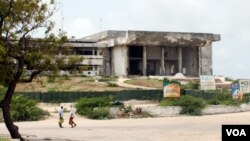ADDIS ABABA - The leaders of Somalia's competing political factions are meeting with international mediators to tackle critical issues standing in the way of the formation of a post-transition government.
All of Somalia's top political leaders are attending the closed door talks, which are expected to last at least two days. President Sheikh Sharif Ahmed is here, along with Prime Minister Abdiweli Mohamed Ali, as well as the speaker of the House and the president of the breakaway northern region of Puntland.
Also here are special envoys from a host of interested parties hoping to help these politicians bring an end to Somalia's reputation at one of the world's worst failed states.
Despite the smiles and handshakes, the participants know they face a monumental task in following the internationally-agreed plan to a functioning government by August 20.
One diplomat quipped that the road map is more like a minefield, strewn with explosive issues. Among them is selecting a group of 825 elders from among Somalia's feuding clans who will ratify a constitution and choose members of a post-transition parliament. The road map calls for the parliament to be in place by June 15.
Transitional Prime Minister Abdiweli Mohamed Ali says he believes it can be done, if all parties negotiate in good faith.
"Most of the issues are agreed upon. There are contentious little things that there [are] some disagreements on -- the elders and also the Constitution. These are things that are not insurmountable. We can agree. And if you have honest and open dialogue, we will be able to reach a consensus on these issues," Ali said.
In an earlier interview, Prime Minister Ali called the selection of the 825 elders a critical step in meeting the August deadline.
"After that, we reduce parliament from 550 to 225 because Somalia cannot afford a parliament of 550 members. So we're going to have a lean, more efficient parliament in July. They will elect a speaker, then a president and the establishment of a new government by August, 2012," Ali said.
With 90 days until the transitional government's mandate expires, the parties are racing to settle their differences.
Diplomats attending the meetings say the massive tasks facing negotiators might require extending the two days of meetings. One representative of a western country, who asked not to be identified, issued a cautiously optimistic prediction, saying, “They will succeed because they have to.”
All of Somalia's top political leaders are attending the closed door talks, which are expected to last at least two days. President Sheikh Sharif Ahmed is here, along with Prime Minister Abdiweli Mohamed Ali, as well as the speaker of the House and the president of the breakaway northern region of Puntland.
Also here are special envoys from a host of interested parties hoping to help these politicians bring an end to Somalia's reputation at one of the world's worst failed states.
Despite the smiles and handshakes, the participants know they face a monumental task in following the internationally-agreed plan to a functioning government by August 20.
One diplomat quipped that the road map is more like a minefield, strewn with explosive issues. Among them is selecting a group of 825 elders from among Somalia's feuding clans who will ratify a constitution and choose members of a post-transition parliament. The road map calls for the parliament to be in place by June 15.
Transitional Prime Minister Abdiweli Mohamed Ali says he believes it can be done, if all parties negotiate in good faith.
"Most of the issues are agreed upon. There are contentious little things that there [are] some disagreements on -- the elders and also the Constitution. These are things that are not insurmountable. We can agree. And if you have honest and open dialogue, we will be able to reach a consensus on these issues," Ali said.
In an earlier interview, Prime Minister Ali called the selection of the 825 elders a critical step in meeting the August deadline.
"After that, we reduce parliament from 550 to 225 because Somalia cannot afford a parliament of 550 members. So we're going to have a lean, more efficient parliament in July. They will elect a speaker, then a president and the establishment of a new government by August, 2012," Ali said.
With 90 days until the transitional government's mandate expires, the parties are racing to settle their differences.
Diplomats attending the meetings say the massive tasks facing negotiators might require extending the two days of meetings. One representative of a western country, who asked not to be identified, issued a cautiously optimistic prediction, saying, “They will succeed because they have to.”




